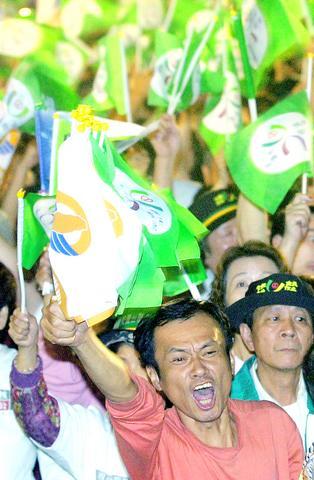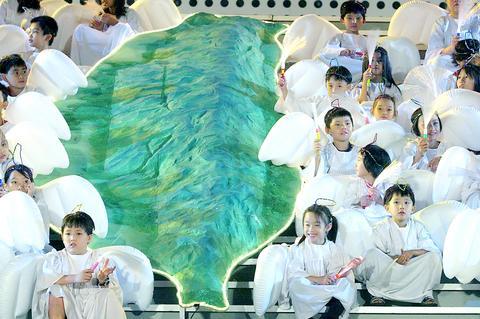Some 200,000 people took to the streets of Kaohsiung yesterday to support President Chen Shui-bian's (陳水扁) appeal for a new constitution through a national referendum, saying that it was time for Taiwan to adopt a new identity and become a real country.
Chen has repeatedly said that the new constitution would be completed before the end of 2006 and implemented by 2008, with its contents being decided by referendum.
The referendum march was organized by the Democratic Progressive Party (DPP), the Taiwan Solidarity Union (TSU), the Alliance for Legislating a Plebiscite Law (公投立法推動聯盟) and pro-independence organizations.

PHOTO: SEAN CHAO, TAIPEI TIMES
It attracted supporters from all over the country, with many foreigners also joining in the march to express support for Taiwan's democratic reform.
By noon, crowds from Taoyuan, Taipei and central Taiwan had gathered to wave flags in front of the Kaohsiung Museum of Fine Arts.
"I hope my children can experience the democratic movement and learn the spirit of people power," said 40-something Kaohsiung resident Yang Yun-tsung (楊允村), who brought his six-year-old daughter and other family members to join in with the march.

PHOTO: SEAN CHAO, TAIPEI TIMES
The march demonstrated the strength of support southern Taiwan offers the democratic and independence movements.
DPP Legislator and head of the Alliance for Legislating a Plebiscite Law Wang Sing-nan (
"We are not trying to fight China to death, and we do not have to reflect on historical tragedies and shadows," Wang said. "We just want to urge the public to think about Taiwan's future together."
At the beginning of last night's rally, Chen presented an oversized mock constitution to signify what he said was the opening of a new chapter in the nation's democratic development.
During his speech, Chen stressed that the nation's ailments -- such disagreements over the system of government, citizens' rights and legislative structure -- can only be settled by amending the Constitution through a referendum: "The draft referendum bill recently proposed by the opposition KMT and PFP sets down too many limitations for citizens to exercise their right of direct democracy," Chen said.
Chen told the cheering crowd not to expect much from the opposition alliance, especially Chinese Nationalist Party (KMT) Chairman Lien Chan (連戰) and People First Party (PFP) Chairman James Soong (宋楚瑜).
"They have been lying to you for the past few years, just like they mocked our efforts to push for the birth of the Constitution when we first introduced it," Chen said. "Now they're turning around and making the same pledge."
Whipping the night crowd into a frenzy, Chen ended the rally with repeated calls to support the DPP's campaign to push for the enactment of a referendum law and the drafting of a new Constitution.
One KMT member told listeners he backed Chen's push for democratic reform: "I am the borough chief of the Shuihsien borough in Tainan City," Shen Lien-che (沈廉哲) said. "My friend and I took the day off and drove to Kaohsiung. Although we're KMT members, we hope the DPP can continue to promote democracy and create a new constitution and avoid a return to the old ways."
Earlier in the day, Vice President Annette Lu (呂秀蓮) delivered the opening speech. She said that the day signified the end of three old eras, including Japan ending its regime in Taiwan on the same day in 1945, the UN terminating Taiwan's delegacy in 1971 and the Chiang dynasty ending its influence in Taiwan with the death of Madame Chiang Kai-shek (蔣宋美齡).
"The end of these three eras also marks the beginning of three new eras," Lu said.
"At this point Taiwanese people should think about how to give the power back to the people, how to rebuild the relationship between the people on the two sides of the strait and how to establish a new identity for Taiwan as a country."Also See Story:

AIR SUPPORT: The Ministry of National Defense thanked the US for the delivery, adding that it was an indicator of the White House’s commitment to the Taiwan Relations Act Deputy Minister of National Defense Po Horng-huei (柏鴻輝) and Representative to the US Alexander Yui on Friday attended a delivery ceremony for the first of Taiwan’s long-awaited 66 F-16C/D Block 70 jets at a Lockheed Martin Corp factory in Greenville, South Carolina. “We are so proud to be the global home of the F-16 and to support Taiwan’s air defense capabilities,” US Representative William Timmons wrote on X, alongside a photograph of Taiwanese and US officials at the event. The F-16C/D Block 70 jets Taiwan ordered have the same capabilities as aircraft that had been upgraded to F-16Vs. The batch of Lockheed Martin

GRIDLOCK: The National Fire Agency’s Special Search and Rescue team is on standby to travel to the countries to help out with the rescue effort A powerful earthquake rocked Myanmar and neighboring Thailand yesterday, killing at least three people in Bangkok and burying dozens when a high-rise building under construction collapsed. Footage shared on social media from Myanmar’s second-largest city showed widespread destruction, raising fears that many were trapped under the rubble or killed. The magnitude 7.7 earthquake, with an epicenter near Mandalay in Myanmar, struck at midday and was followed by a strong magnitude 6.4 aftershock. The extent of death, injury and destruction — especially in Myanmar, which is embroiled in a civil war and where information is tightly controlled at the best of times —

Taiwan was ranked the fourth-safest country in the world with a score of 82.9, trailing only Andorra, the United Arab Emirates and Qatar in Numbeo’s Safety Index by Country report. Taiwan’s score improved by 0.1 points compared with last year’s mid-year report, which had Taiwan fourth with a score of 82.8. However, both scores were lower than in last year’s first review, when Taiwan scored 83.3, and are a long way from when Taiwan was named the second-safest country in the world in 2021, scoring 84.8. Taiwan ranked higher than Singapore in ninth with a score of 77.4 and Japan in 10th with

SECURITY RISK: If there is a conflict between China and Taiwan, ‘there would likely be significant consequences to global economic and security interests,’ it said China remains the top military and cyber threat to the US and continues to make progress on capabilities to seize Taiwan, a report by US intelligence agencies said on Tuesday. The report provides an overview of the “collective insights” of top US intelligence agencies about the security threats to the US posed by foreign nations and criminal organizations. In its Annual Threat Assessment, the agencies divided threats facing the US into two broad categories, “nonstate transnational criminals and terrorists” and “major state actors,” with China, Russia, Iran and North Korea named. Of those countries, “China presents the most comprehensive and robust military threat